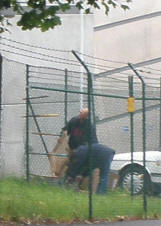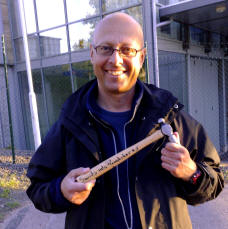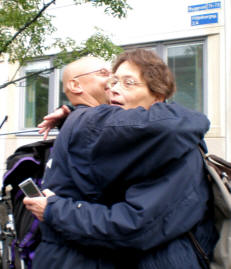The story by The Nuclear Resister on
SAAB Microwave Becoming2 Ploughshares
Per Herngren and Ulla Røder climbed over the fence at SAAB Microwave’s test range at Mölndal, Sweden on June 24 and 26, 2008, and planted fig trees in the area around the factory. Using blacksmith hammers, they started to disarm military radar and parts of the test range. They spoke to workers and guards about their intent until police arrived and arrested them half an hour later.
Charges may be filed in the coming weeks. Herngren is already scheduled for trial with four others August 13 for participation in the August, 2007 Vine and Fig Trees action, also at SAAB Microwave. The pair have each spent over one year in prison for past Ploughshares and other anti-war actions.
“The word of the prophet Micah makes us move”, explains Røder. “We beat swords into ploughshares. We do not protest against the missile firing system of SAAB Microwave or the military radar system. We choose to drop the protest as it becomes reactive and negative. The time has come to intervene and become creative.”
“We do have the ability of direct intervention,” Røder believes. “It becomes a duty when there are violence and suffering in the world. We use nonviolence. Contrary to my friend Per, I do not believe that we are practicing civil disobedience, but rather upholding international law. It is SAAB Microwave which breaks the law delivering the missile firing system used during the war in Iraq.”
While preparing for the action, the disarmament activists collaborated with academic thinkers in the tradition of the 20th century French philosopher Gilles Deleuze.
“‘Becoming2‘ (like a mathematical ‘becoming-squared’) in the middle of our name might look strange,” says Herngren. “During the ploughshares action, we worked together with Deleuze philosophers from Gothenburg University in Sweden. We were during one day plugged into each other. Together we examined how resistance and Deleuze’s philosophy will intensify each other. Deleuze highlights the double becoming rather than being: To become becoming, rather than to become something. To produce production rather than isolated actions! Resistance and philosophy are ongoing processes giving no final result. Deleuze forces us in the ploughshares to avoid thinking the Big Action. Actions are not the destination, but rather disobedience actions are where we get on the train. For Deleuze, resistance is about movement, speed, slowness and intensity.”
Further insight on the post-protest perspective is found in a 2005 essay, Beyond protest-resistance by Per Herngren and British ploughshares activist Stephen Hancock. They wrote, “…We discerned several elements to protesting: protesting is by definition against something rather than for; it involves a tone of complaint; it appeals to others – usually political leaders – to do something about the issue. Protest reinforces both our passivity and the hierarchy’s power. It leaves us, at the end of the day, with dog-eared placards and our fate still in the hands of distant leaders reassured by our protesting that they are the ones in power.”
The Nuclear Resister #149, July 3, 2008, p. 3
 Per Herngren in front of the SAAB Microwave Test Range
Per Herngren in front of the SAAB Microwave Test Range
‘one was born into this life to share the time that repeatedly exists between moments; the time of Becoming, before Being risks to confront one yet again with undefeated despair.’
John Berger
 Per Herngren and Ulla Røder released after the interrogation.
Per Herngren and Ulla Røder released after the interrogation.
Deleuze’s dictionary
- Becoming
- Innovations
- Assemblage
- Multiplicity
- Rhizome
- Affect
- Society
- Abstract machine
- Social machine
- Self
- Body
- Exteriority
- Language
- Consistency
- Order
- Plateau
- Strata
More on ploughshares and civil disobedience
Start
Ploughshares trial 2009
Hammering on military radar
Plowshares movement
Aspects of Visuality and Power
Nuclear Resister’s Becoming Ploughshares
Deleuze and becoming resistance
Pictures of the plowshares action
Classical theory of resistance
Postprotest by Per Herngren
Manual for civil disobedience
Per Herngren English
Kurdish, Polish, Arabic, Spanish, Dutch
